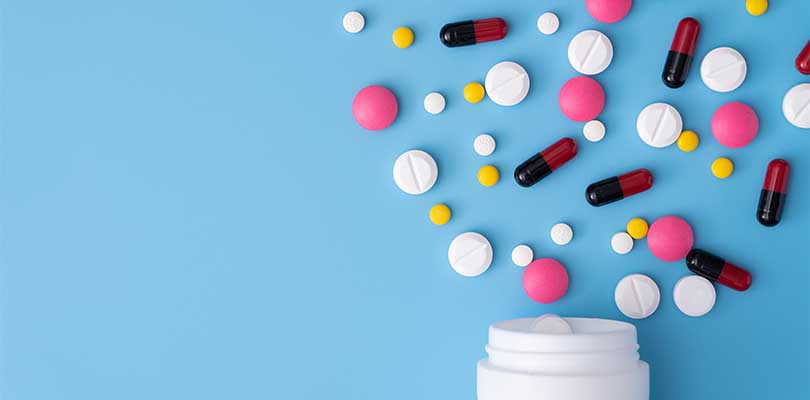What Medications Cause Overactive Bladder?
An overactive bladder (OAB) involves an uncontrolled urge or sudden need to urinate. Most of us have increased our fluid intake at some point, which led to more trips to the bathroom. But an overactive bladder is different. It does not occur due to an increase in fluids. Although, some medications can cause this. So, what medications cause overactive bladder? We will take a look shortly.
An overactive bladder is not the same thing as urinary incontinence. Urinary incontinence occurs when urine leaks out involuntary. Either condition can develop on its own, but they can also occur together. An overactive bladder can often lead to urinary incontinence.
OAB Symptoms
An OAB is a common condition. According to the Urology Care Foundation, up to 40% of women and 30% of men in the U.S. have symptoms of an overactive bladder.
Symptoms include:
- An urgent need to urinate
- Involuntary loss of urine
- Waking up frequently to go the bathroom
- Urinating more than eight times in a 24-hour period
Several factors can lead to an OAB, including neurological disorders, hormonal changes, and weak pelvic floor muscles.
Medication side effects can also cause an overactive bladder. This article takes a look at how certain drugs can cause OAB and what you can do to cope with it.
The Relationship Between Medications and OAB
Medications may cause additional reactions beyond their intended effects. Some drugs used to treat various conditions may have unwanted effects on the bladder or the amount of urine produced.
Certain drugs can contribute to OAB for a variety of reasons. For example, some medications cause an increase in urine production. If urine production increases quickly, it can create a sudden need to go to the bathroom.
Other drugs can affect the bladder’s ability to empty completely, which leaves a person feeling like they have to go to the bathroom frequently.
In some instances, a combination of factors can contribute to OAB. For example, if someone has weak pelvic floor muscles, that can contribute to urinary incontinence. The combination of a medication that can cause OAB and weak pelvic floor muscles may increase symptoms.
Which Medications Can Cause OAB?
Some medications help with an overactive bladder and are used to treat the condition. But in other instances, your medications may be the culprit leading to urinary urgency.
There are several classes of medications that may lead to OAB, including the following:
1. Diuretics
Diuretics are a type of medication that helps stimulate the kidneys to get rid of water and salt from the body in the form of urine. It is prescribed for people who may retain fluid. One of the most common drugs used is Lasix. Because it stimulates the body to make more urine, it often causes OAB.
2. Blood Pressure Medications
Alpha-blockers are a type of medication used to reduce blood pressure. They work by dilating the blood vessels in the body, which can increase urinary urgency. Examples of alpha-blockers include prazosin and doxazosin mesylate.
3. Antidepressants
Different antidepressant medications may prevent the bladder from emptying completely. This may cause an increased urgency to use the bathroom. Some antidepressants also decrease a person’s awareness that they need to urinate, which can lead to urinary incontinence.
4. Narcotic Pain Medications
Similar to antidepressants, narcotic pain medication may also prevent the bladder from contracting and emptying fully. If the bladder does not fully empty, it creates a sense of urinary urgency.
Tips to Cope With OAB Due to Medications
If you have OAB due to a medication side effect, there are several things you can do to cope with the condition, including the tips listed below.
Talk to Your Doctor
The first step is to talk with your doctor about the problem. Making your doctor aware of the condition is an essential part of correcting the issue. But do not stop taking your medication without consulting your physician. Your doctor may be able to switch your medication to something else or adjust the dosage.
Learn Bladder Training
Bladder training may help reduce urgency. Bladder training involves gradually increasing the amount of time you delay urinating.
Pelvic Floor Exercises
Exercises that strengthen the muscles of the pelvic floor can help improve how well you hold your urine. Talk to your doctor about how to properly do pelvic floor exercises.
Dietary Changes
Certain types of food and drinks may increase urinary urgency in people who have OAB. Making some dietary changes will not necessarily prevent the problem. But it may decrease symptoms. Consider limiting the foods and drinks below:
- Alcohol
- Coffee
- Tea
- Caffeinated drinks
- Spicy foods
- Artificial sweeteners
Add Vitamin C
Vitamin C may help decrease symptoms of OAB. According to the National Association for Continence, eating foods rich in vitamin C may reduce urinary urgency. Good sources of vitamin C include strawberries, citrus fruit, and dark, leafy greens. While eating foods high in vitamin C is helpful, overdoing vitamin C supplements may have the opposite effect.
